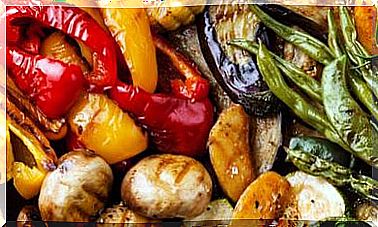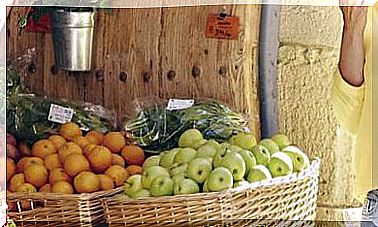12 Ideas For You To Slowly Enjoy Summer
Summer invites you to connect with life, to give yourself space to feel and think about what is important to you. Slowness can make for a very rich experience.

The hottest months are presented as an appointment with rest, enjoyment and slowness.
During the rest of the year the priorities may be different but the good weather seems to push us to slow down and live with greater attention.
Being faithful to what the clock dictates can have a very high price: that of well-being and health, since stress and a diet based on fast and ready meals is the main cause of obesity and coronary heart disease and the nervous system. In addition, with this, the person goes superficially through the string of things that must be fulfilled, which generates dissatisfaction.
Before an illness imposes a mandatory stop, it is convenient to slow down and adopt measures that lead to living with greater serenity, to enjoy the moment more without having to postpone happiness until the next weekend or vacation.
It is about changing the attitude from day to day : working and enjoying work, but not living to work; eating at a slower pace – not gulping – and making up time to do nothing or do whatever you want, even if it doesn’t seem productive: reading, playing with children, going for a walk, lying in the sun, meditating or sharing moments of friendship.
Already the sages of antiquity proposed to flee from social imperatives, as for a few years the slow movement has been put into practice , a cultural current that was born in Rome in 1986.
Its emblem is a snail and in its beginnings it claimed local gastronomy as a cultural asset compared to fast food imported from the United States, and the tasting, slowly and with time, of healthy traditional dishes, without additives, preservatives or colorings.
For the members of this movement, as well as for so many other people who are aware that life marked by haste is not life but rather survival, it is important to recover moments for pause and reflection, to listen to others and win. the dominant lack of patience, as Carl Honoré assures in his famous book In Praise of Slowness .
Here are some suggestions to enjoy the tranquility this summer.
1. Review priorities
Speed becomes the perfect excuse for not having to reflect on your own life, but if you really want to change certain aspects of your daily reality, because they are limiting or unsatisfactory, you have to start by stopping to think about how you feel about it. your skin –with what it is and what it has–, what it really needs –maybe you can be happier with less …–, what things and relationships you can do without and how you can better organize your time so that your life gains serenity and make more sense.
Otherwise, as Jon Kabat-Zinn states in his book The Power of Attention , “the momentum of what we have to do will eventually dominate us and may force us to live its order of the day, rather than our own, almost as if let’s be robots. “
Reviewing priorities allows you to maintain those activities and relationships that are really necessary or fulfilling, and detach yourself from those others to which time is dedicated by mere inertia or commitment.
A good way to start better organizing your daily schedule is to make a list with the six or ten issues that are considered important to address during the day in different areas: work, family, home, leisure, social relationships … You have to be realistic and ensure that there is a balance between obligations and personal activities.
What at the end of the day has not been fulfilled can go to the beginning of the list the next day so that, day by day, the purposes can be attended to and so that, at the same time, what has not been done does not weigh in the mind causing anxiety and impatience.
2. Focus on the present
It is easy to live turning over the past, projecting yourself into the future and turning your back on the present, when this is the only real moment that is worth living.
The rumination of the mind between the frustrations related to the past and the worries about what is to come, leads to living in a permanent flight from oneself, and can plunge the person into a frantic activity in search of a happiness that always it is yet to come, because it never seems to satisfy at all when it is glimpsed: “something” more is always expected.
Being open to enjoying the richness of the present by cultivating the “beginner’s mind” –the mind willing to see everything as if it were the first time–, with the ability to wonder in children, helps to have a more serene, real and joyful of life.
This disposition makes possible a deeper and sincere relationship with oneself, more aware of what is happening, more patient, and the person becomes more receptive and creative to what may happen.
Some keys to focus on the present are to savor each moment as if it were the last in existence, or as if everything were new, with a positive attitude towards what is happening: at work, with your partner and family, on the street. .. and flow with what life shows at all times, without making value judgments and accepting with love what happens, as an evolution in personal experience that teaches us something worth learning.
3. Savor the food
In the same way that taking soft and deep breathing helps the body to oxygenate itself correctly and to see things from a different perspective, eating without haste is essential if the nutrients ingested with food are to be beneficial.
Joe Dispenza explains in his book Develop your brain that stress prevents the organs responsible for digestion from receiving an adequate blood supply, so scrupulously taking care of food, following a personalized diet or taking a myriad of vitamins can be insufficient: if not you metabolize what you eat these efforts are in vain.
On the other hand, eating quickly and with anxiety leads to bad salivation and filling with air, which can end up causing gas, abdominal pain and a feeling of bloating.
Giving yourself time to eat, as well as eating fresh, healthy products free of harmful fats is essential for the proper functioning of the body.
In addition, different studies suggest that eating quickly makes you eat more and gain weight, since, apparently, when you eat in a hurry, the sensation of appetite is prolonged and this leads to overeating. Chewing food well and using a knife and fork help to slow down and enjoy the different flavors.
To regain the pleasure of eating and its ritual, you can stay with a friend, or if you stay in the office, share that moment with your co-workers. It helps to relax and give that meal time the importance it has.
It is worth taking advantage of this break to also enjoy the chosen company. Just as important as choosing quality food is also eating them calmly and harmoniously, participating in a relaxed conversation and perhaps sharing the small events that mark daily life.
4. Enjoy nature
Going out to meet nature is one of the greatest gifts that one can give oneself to leave behind the daily agitation of cities.
Walking without a watch through a forest or through the mountains for a whole day, or as much as you want, without responding to any prior plan that forces you to do anything, allows you to immerse yourself in a world of fundamental sensations and sounds for the human being.
Suddenly fresh, clean air fills the lungs ; the birds sing to life, the silence restores our calm, the stream refreshes and reminds us of our origin, the presence of the trees balances and comforts with their majesty and power, and the sunlight and the path make the view recreate the beauty of the landscape and let us enter ourselves without stress, so that we can put our thoughts in order and reflect with lucidity.
In addition, walking allows you to exercise the body, helps eliminate toxins and tensions and invites you to leave the accumulated excitement behind.
Staying to witness the sunset, enjoying the moment, makes the experience even more profound and liberating, if possible.
5. Breathe deeply
The physical and mental stress caused by the need to attend to the multiple fronts of accelerated life activates the sympathetic nervous system, the fight or flight mechanism that goes off in alarm.
This mechanism sets off a whole series of physiological changes, from the secretion of adrenaline to muscle tension, and leads to shallow chest breathing that allows for rapid action, but in the long run it does not allow good oxygenation and maintains the activation of the system. sympathetic.
All of this can fuel a chronic stress or anxiety disorder.
Taking slow, deep and regular diaphragmatic breathing can induce calm again and make you feel more relaxed and emotionally stable.
To achieve fuller breathing, you can do the following exercise:
- Sitting or lying comfortably on the floor, one hand is placed on the chest and the other on the abdomen. This helps you feel the movements that the entry and expulsion of air produces.
- At the beginning, you just have to respect the breathing you start from, without wanting to modify it, no matter how agitated it may be. The simple fact of becoming aware of it is already beginning to calm her down.
- Little by little, the inspirations and exhalations lengthen. To do this, the air is taken through the nose and slowly led to the lower part of the lungs, progressively swelling the abdomen without moving the thorax. The air is held in that position for a moment.
- Finally, it is released little by little by exhaling through the nose and deflating the belly, without moving the thorax.
6. Listen and think before answering
“If you speak, give time for your word to reach the soul of the one who listens to you and also for his word to reach you. How often, before the others have finished speaking, have we interrupted them to say our thing? Letting the other person speak is not holding the wick, but being able to receive, “says philosophy professor Josep Maria Esquirol in his book El respirar de los dias .
Something that reflects the profound change in social relations in the modern world is the lack of time to dedicate to others : to stop to talk with the neighbor, to listen to the other until he finishes, to call on the phone that friend who makes so long that we do not see …
The encounters are usually so fleeting and impatient that they hardly allow us to delve into anything or understand well what they are saying at times.
A recommended action to slow down is to practice active listening. It consists of really listening, showing interest, receiving what they are saying to us, without any haste or concern to respond.
Dialogue, to be sincere and enriching, needs attention. Otherwise, it is reduced to a simple chatter destined to listen to oneself, in which exchange is not possible.
7. Travel without pressure
The summer holidays are for many the most opportune time of the year to completely relax and take life more calmly.
That is if they do not become an extension of the day-to-day work, organizing them excessively and depriving them of the improvisation they require so that they truly allow them to live in the moment and enjoy themselves.
An interesting goal is to try not to program everything. When going on a trip, it is advisable to anticipate certain things, especially if you are going to a foreign country, but it is also very interesting to see how the trip goes and act on the fly, letting yourself be carried away by your own desires at all times.
Wanting to see everything by following a suffocating program prevents us from delving into what is most attractive.
The best thing about trips is the possibility they offer to find oneself in settings, cultures and ways of doing things different from one’s own.
Traveling with a receptive mood and a willingness to adapt to other ways of life enriches the experience, gives it more meaning.
Trying food without prejudice, accepting that you may not sleep very comfortable, being able to appreciate hospitality, taking things as they are … they turn some discomforts and insecurities into an opportunity for growth, in instead of an inconvenience.
Whether you are traveling on your own or using an organized trip, you will have to mobilize and develop your own resources. In some cases to face the unforeseen with creativity and tolerance and, in others, to get along with the rest of the group and adapt to the schedule of activities.
8. Recover the taste for reading
The daily rush often means that the pleasure of reading is renounced, to read for the mere pleasure of reading and not only valuing the concrete usefulness of what is read.
Thus, we miss one of the most enriching and fun practices that we have easy access to.
“Good books are not in a hurry,” said the father of anthroposophy Rudolf Steiner. They are works that quiet the spirit.
If you are not a good reader, even reading a newspaper, a magazine or a comic can help you take a break.
Reading in public transport on the way to work, or lying in the living room at home, on the beach, in moments of rest … can be very stimulating : books allow you to fly into the rich world of fantasy and words, they constitute a source of learning and calm the mind by managing to abstract it from the daily hubbub.
9. Play with children
Basketball, football, running, riding a scooter, building sand castles, chess … Playing with our children, nephews, or with children in general, allows us to enter a present time in which the most important is what is being done: play and enjoy, without further ado or expectations.
As Josep Maria Esquirol states: “Giving time is eminently engendering, giving birth. Giving time is raising and educating. Giving time is caring and accompanying. Such is the gift of time without a clock”.
The benefits of these moments are multiple:
- They allow them to stop doing other things and at the same time give these children the attention they deserve.
- By approaching them in their games , the relationship is deepened, which is not limited only to educating, guiding and advising them, but extends to sharing leisure time. This creates a greater complicity.
- Both they and we came out of the dominant stress spiral to live a time of laughter, fun and love that will always be remembered as the most precious of gifts.
10. Yoga for serenity
The practice of yoga constitutes a great “school of slowness”, as it teaches to still the breath, to exercise attention and to calm the mind while in contact with oneself.
By remaining in the postures in silence and focusing on the sensations that arise naturally, you learn to listen, to wait, and to know yourself.
The changes that are experienced throughout a yoga session, both on a physical and mental level, become very eloquent at the end of the practice, when when rising from the final posture of savasana (or “from the dead body”), it is verified that the walk has become lighter and that the movements unfold in a more harmonious way, as if tempered by an inner serenity.
It is the same serenity that seems to have settled in the mind and that, in many cases, has come to replace the initial tiredness and regret.
The vision of things also becomes more equanimous, distanced from the whirlwind that previously seemed to be imprisoned, and a harmony with the surrounding people is perceived . Thought, like the body, seems to engage in a natural, almost primal inner rhythm, through which it flows unhindered.
The benefits of yoga are multiple and well known by those who follow the path of wisdom that it proposes:
- The body and mind are disciplined but gently, attending to the particularities of each one and of each moment, from the respect of oneself.
- The changes come by themselves, without the need to fight for them. By discovering and accepting personal strengths and limitations, it is possible to gain physical and mental flexibility, as well as confidence.
- It is a process necessarily marked by slowness, in which haste or acceleration are not worth it, and which leads to connecting with the spiritual dimension of the person.
Yoga philosophy considers that when the agitation of the intellect is quieted by this practice, one rests in the spirit that resides within and enters into communion with something higher, outside the limits of the senses and free from pain and affliction.
It is advisable to enter yoga accompanied by a teacher who guides and transmits their knowledge, but sometimes an experienced friend may suffice to get started.
In summer, environments such as a park or the beach when it is not very hot, can be an invitation to try the simplest postures.
11. Go to work by bike or walking
The body welcomes a little movement and the mind finds rewarding stimuli.
Whenever distances from home to work allow it, walking or cycling is a calmer and more energetic way to start the day than going by car or public transport.
Free from the hustle and bustle caused by traffic jams and sometimes delays on the bus or subway, this option allows you to move around practicing gentle exercise, being outdoors and taking the opportunity to go through corners that you like.
You can modify the route, perceive the subtle changes in temperature and nature as the different seasons advance, be attentive to the people you come across … and thus start the day calm, vital and good. humor.
12. Do not do more than one thing at a time
“One thing after another and never too many,” the classical sages sensibly advised.
As much as one tries to run, to do things well it is necessary to take time and not try to solve everything at once. It is preferable to attend to one thing first and then another, feeling that something important is being built.
Good books, good films, good works of art, good music … have required time to prepare, they have required the maturation of their author as they progressed in their realization.
There are issues that can be resolved immediately, but others require patience. Sometimes it is better to wait for tomorrow because you are not inspired; putting time in between can lead to better responses.
Books to take life easy
- The breathing of the days; Josep M. Esquirol, Ed. Paidós
- Slow slow…; María Novo, Ed. Obelisco
- Praise for slowness; Carl Honoré, Ed. RBA









